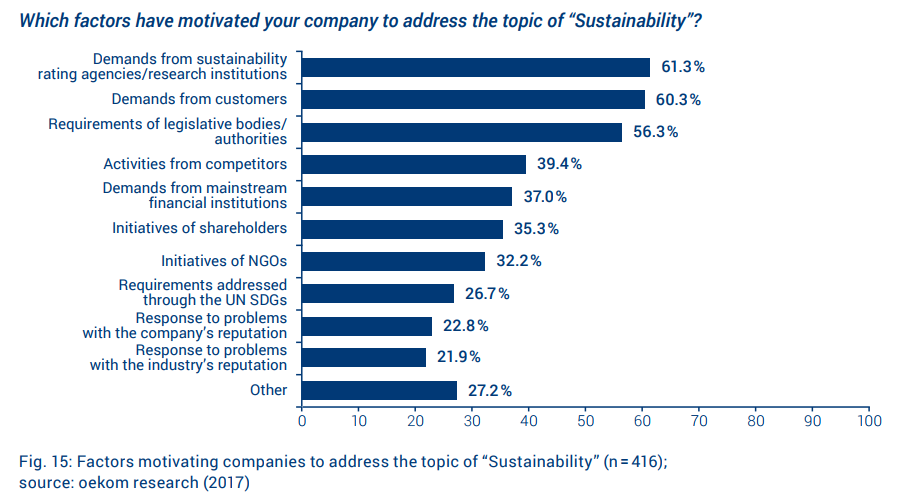In its new Impact Study 2017, an extended new edition of an earlier study from 2013 on the influence of the responsible capital markets, oekom research sees a clearly positive development. The impact that responsible investors, banks and rating agencies have on the companies’ sustainability efforts has increased considerably since the last survey in 2013. Over 36 percent of companies, an increase of four percentage points from four years ago, confirm that the requirements of sustainability analyses have an influence on their general business strategy.
The oekom Impact Study 2017 was conducted in partnership with PRI (Principles of Responsible Investment). In total, 3,660 companies were surveyed, of which a total of 475 companies from 36 countries and across 50 industries participated. The study was supported by Metzler Asset Management and the Evangelische Bank, as well as further institutional investors and asset managers.
Conclusions
Relevance of sustainability for companies
• More than 91 per cent of the companies regard sustainability as being important. 50.5 per cent of the polled companies give a “Very high” priority to the topic of sustainable development, while 41.3 per cent classify it as “Fairly high”.
Drivers for sustainability
• Companies regard sustainability rating agencies as the primary driver of sustainability, with 61.3 per cent of respondents stating it was this that initially motivated them to address sustainability. Almost as influential, at 60.3 per cent, are the demands and expectations of the companies’ customers. In the first Impact Study in 2013, the top two places
were reversed. In third place were regulatory requirements at 56.3 per cent, significantly higher than the 37 per cent registered in 2013.
• Future expected drivers for sustainability are somewhat different: seen as the #1 motivator by a significant margin are customers’ demands, at 66.8 per cent; this is followed by regulation at 54.1 per cent, shareholder initiatives at 46.6 per cent, and conventional financial service providers’ activities at 45.6 per cent. 41.4 per cent of the respondents continue to see sustainability rating agencies as the most important drivers.
Transparency of the sustainability rating
• The transparency of the rating process and results assigned to the company are vital for the sustainability rating to have a potential impact. Only if companies can understand the reason why they were awarded a certain rating will they be able to take suitable measures to improve the quality of their sustainability management. Companies’ opinions of sustainability rating agency assessments have improved slightly since the first survey in 2013: while the majority of companies continue to regard the rating processes as only “transparent to a certain degree” (42.1 per cent vs. 44.4 per cent in 2013), over 35 per cent now see the rating processes as “transparent” or “completely transparent” — a slight improvement on 2013 (32 per cent).
Relevance of sustainability in financial market communication
• 62.2 per cent of the companies already integrate sustainability management information into their general financial market communication. Almost all the companies (93.1 per cent) predict that this communication will become increasingly important.
• For almost 90 per cent, a good sustainability rating was regarded as important. For 78 per cent of the companies, it is important to be included as a constituent of sustainability funds and indices.
Impact of sustainability on strategy
• More than a third of the polled companies (36.5 per cent) said that the inquiries of sustainability analysts have an impact on their corporate strategies.
• Over 61 per cent, unchanged from the last survey, said that inquiries from financial market players have a “strong” or “very strong” impact on their corporate sustainability strategies. Almost 60 per cent said the inquiries additionally serve as catalysts for optimising certain measures within their respective sustainability management systems.
• For 10.7 per cent of the companies, the company’s assessment in sustainability ratings has an impact on the remuneration structure of the entire management. 22.8 per cent said that this was the case for only selected management positions. This is a slight increase from the 2013 Impact Study — which came in at 8.5 and 21.6 per cent respectively.
Benefits of sustainability ratings for companies
• For 91 per cent of the companies requirements of sustainability rating agencies act as an early-warning system helping them recognise relevant social and environmental sustainability trends early on.
• Over 61 per cent of respondants agree that, “Sustainability analysts’ expectations communicated during the rating process help companies design appropriate sustainability management systems.”
• The majority of the companies (over 77 per cent) use information from the sustainability ratings to analyse the strengths and weaknesses of their own sustainability management systems.
• 62 per cent of companies use the sustainability ratings as a control mechanism and benchmark which allows them to rate the success of their own measures. 20.2 per cent endorse this principle very strongly.
• Over 70 per cent of the polled companies use sustainability ratings regularly as a benchmark for comparing themselves against their competitors.
Importance of the UN SDGs
• For the majority of the companies, the UN SDGs still fail to play an important role. Only 36.2 per cent of the respondents use the SDGs together with other initiatives as a basis for their sustainability
strategies.
• 17.4 per cent of the companies align their sustainability management systems with the UN SDGs, 15 per cent use the SDGs as an aid for their sustainability reporting. 8.4 per cent see them as a means of improving their companies’ relevance on
the sustainable investment markets.
• A majority of the companies (58 per cent) said they would have more motivation to improve their sustainability performance and boost their commitment to implementing the UN SDGs, if there was an SDG label for investors to utilise.



